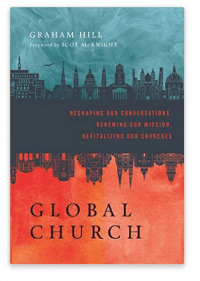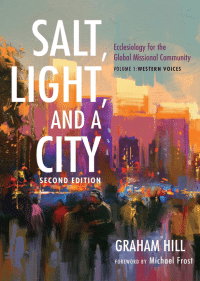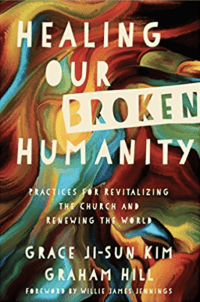7 Inspiring Women: Ruth Padilla DeBorst

In this entry, we look at some of the challenges offered by Ruth Padilla DeBorst.
Ruth Padilla DeBorst is the provost of the Centro de Estudios Teológicos Interdisciplinarios (http://ceticontinental.org). Ruth is a leading voice globally on integral and urban mission. She’s involved in the Latin American Theological Fellowship, and also with Micah Global and INFEMIT (The International Fellowship for Mission as Transformation).
Ruth and her family have been engaged in integral mission, leadership development, and theological education in Latin America (and globally) for many years. Ruth lives in Costa Rica where she shares parenting of their blended, multi-cultural family with her husband, James Padilla DeBorst, and community life with the members of Casa Adobe.
Ruth’s perspectives on integral mission, holistic theological education, service with and among the poor, and cultivating transformative local communities, are prophetic.
Embracing Generous, Local Hospitality
Jesus calls his church to embrace surprising, extravagant hospitality, welcome, and inclusion.
We offer hospitality from this location and to this location. We welcome others into our location, relationships, and place. We offer hospitality to that soil, that ecology, that location, and those relationships.
Ruth Padilla DeBorst shows how Israel’s condition as God’s people was “intertwined with that of the people and place where God had situated them. In its welfare, you will find your welfare.”[1]
We root our hospitality and wellbeing in our home and land and relationships and hope. God calls his people to be “hopeful home-builders.” We nurture land, homes, gardens, children, and earth. We show hospitality to these things. And we extend welcome to strangers with whom we share our lives.
This hospitality requires many conversions.
“Conversion from individualism to community, from autonomy to interdependence, from idolatry to true worship, from grasping to receiving, from oppressive dominion over creation to loving care of it, from indifference to passionate, prayerful action, from Western definitions of ‘development’ to loving participation, from competition to collaboration, from protagonism to service.”
Hospitality involves our relationship to our home, to the earth, and to local place. It involves our connections to local relationships, local soil, and local generosity.[2]
Are we connected enough with these to be hospitable? Are we willing to offer strangers welcome into those places and relationships and lands we love the most? Are we willing to allow others to call our land their land, and our homes their homes?
We need to take these things serious to be welcoming and hospitable.
As we nurture local soils, cultures, homes, and communities, we are able to offer hospitality. Our hospitality expresses itself in actions toward those things and from them.
Ruth Padilla DeBorst says that this involves four things:
1. Building homes and living sustainably in them. This means making these homes a refuge for the homeless, disposed, stranger, and rural and urban poor. (The idea of homes as refuge is truly terrifying for most people—myself included).
2. Planting gardens, caring for creation, and food sourcing. We must recover “our relationship to the earth in the creation-community.”
3. Cultivating families and churches that provide “fertile ground for converted covenantal relations.” We form these relationships through intimacy, simplicity, hospitality, collaboration, and inclusion.
4. Seeking the welfare of the city. This includes its ecology, built environment, socioeconomic elements, human connections, and marginalized persons.[3]
Hospitality is often richest in the context of shared history and generous inclusion. Such shared history with people and place and land is not always possible. But when it is possible and valued, it can provide a remarkable environment for hospitality and inclusion.
What does it mean to enrich shared history through inclusion? It means welcoming others into our lovingly nurtured homes, lands, cultures, communities, and tables. It means recognizing the importance of shared history and the welcome of the outsider. Hospitality is a ministry of inclusion, welcome, and table-fellowship.
“Most communities grant space only to like-minded, like-looking, likespeaking people. But followers of Jesus are called to acknowledge they have been sent as he was into the world, as agents of reconciliation.
So, unafraid of mixing with the ‘wrong’ people, or of not fully belonging, they must stand in the interstices of society; between belief and unbelief, between purposeful and aimless living, between community and disintegration, between the global and the local, between people and nature, between haves and have-nots, between power and vulnerability, between north and south, east and west.
Once they capture a vision of the table of God’s kingdom, submit to Christ’s sovereignty and are filled by the Holy Spirit, followers of Jesus are called to celebrate their unmerited inclusion at the table of God’s kingdom, and both welcome people who look, think, speak and eat differently than they do, and also take the risk of confronting any power that excludes or deprives people of their rightful presence at the table.”
We open up this table and this shared history so that the outsider can become an insider. It is an intentional openness to others entering our lives.
Our hospitality needs to be free and generous and active. John Chrysostom, fourth century Archbishop of Constantinople (in modern day Turkey), charges the church to be given to hospitality.[4]
We welcome people into our homes in hopeful anticipation of our ultimate home. In welcoming them, we welcome Jesus Christ.
Hospitality will often disappoint us. People will wound us, use us, and let us down. They will betray our trust and refuse to reciprocate in kind. Hospitality will be a “now/not yet” experience. Sometimes, it will be as unpleasant as foot washing. Some will offer us hospitality in return—enriching our lives more than we could have imagined. It was like that for Jesus.
But hospitality makes us fuller, richer, more Christ-like people. We welcome people into our homes and lives and lands in anticipation of the home and the age to come. And in doing so, we are a foretaste of our ultimate home and of the age to come in Christ Jesus.
We must be churches and homes and families “at which immigrants, people of diverse cultural backgrounds and different languages are welcome, not as oddities or welfare cases, but as fully-fledged members.”[5]
We replace exclusion with embrace, hostility with love, prejudice with respect, judgment with grace, greed with generosity, envy with contentment, fear with hope, rejection with welcome, frigidity with warmth, and isolation with community and hospitality. We do this in response to the extravagant grace and welcome offered to us by Jesus Christ. And we do this as witnesses to Christ and the coming age. He’s our peace. He reconciled us to God and to each other.
“Consequently, you are no longer foreigners and strangers, but fellow citizens with God’s people and also members of his household, built on the foundation of the apostles and prophets, with Christ Jesus himself as the chief cornerstone. In him the whole building is joined together and rises to become a holy temple in the Lord. And in him you too are being built together to become a dwelling in which God lives by his Spirit.” (Ephesians 2:19–22).
On the final day, Jesus Christ will gather a great multitude from every nation, tribe, people, and language, to worship him. (Revelation 7:9–17). The welcome and hospitality we practice now reflects what he has already done, and what he is going to do in the age to come.
Embracing God’s Multicultural, Multifaceted Banquet Table
Following the hospitality of God, the church must offer this hospitality to the most unlikely people and in the most unexpected places. Ruth Padilla DeBorst says that God calls his church to welcome “unexpected guests” at God’s multicultural, multifaceted banquet table.
The church’s witness is more than word or deed—it witnesses to Christ in its total life together and toward the world. It testifies to Jesus’ passion and power and welcome in its being. The church is hospitable because God is hospitable.
“In so doing, or rather in so being, the church—the multi-faceted community of Jesus disciples, gifted in ‘many tongues’ by the Spirit—indwells God’s story, she takes on God’s mission in the midst of clashing and blending human cultures, and is used by God to weave those strands into meaning and life-granting wholes.”
The church’s hospitality is a participation in the mission of God and an expression of its hopeful expectation. Hospitality gives us a taste of that which is to come. We are welcoming the stranger and neighbor to God’s banquet table.[6] This is a table where all socio-cultures, ethnicities, languages, genders, and people groups are welcome. They are welcome to take part in the hospitality of God.
Embracing Third-Culture Lifestyles and Mission
Ruth Padilla DeBorst challenges churches to develop disciples and fellowships that are third-culture. By this, she means that Christians must embrace the particular culture of the Christian faith. But they must also engage “meaningfully, and with a sense of belonging, with people from very diverse cultural backgrounds.” (She uses third-culture children as an example. These grow up with two cultures. They find meaningful and creative ways to put these cultures into dialogue).[7]
God calls us individually and communally to this task. It’s vital to the reactivation of koinonia and the fulfilment of mission.
Ruth Padilla DeBorst puts it well:
“God’s kingdom is not some amorphous, supra-cultural, other-world milieu. Rather, it is a space of vibrant, life-giving, God honoring encounter of spice and colour, smell and sound, here and now, in the complex entanglement of human relations. As third-culture people, followers of Jesus are called to live today in the light of the completion of God’s story, with daily expectation of Christ’s imminent return. They are called to express in their daily interactions, the confident belief that one day the triumphal choir before God’s throne will be composed of a great multitude from every nation, tribe, and people, proclaiming, on bended knee, God’s sovereignty in their own distinct languages…
In as far as Christian communities the world over live together in light of God’s grace-full story, they become historically visible and culturally alternative out-workings of God’s mission and localized expressions of the bountiful banquet of God’s kingdom.”[8]
Jesus invites us to embrace his generous and local hospitality, his multicultural and multifaceted banquet table, and third-culture lifestyles and mission.
Other posts in this series
Want more on Ruth Padilla DeBorst’s perspectives and challenges? This blog post is an excerpt from Chapter 5 of my book “GlobalChurch: Reshaping Our Conversations, Renewing Our Mission, Revitalizing Our Churches.” You can get the book here.
______________________________________
Want to see a filmed video and podcast with Ruth Padilla DeBorst, including a small group study guide? You can get these here.
Here’s a Study Guide for that filmed video and podcast:
Ruth Padilla DeBorst – Study Guide for Filmed Interview & Podcast
This resource is designed to facilitate your small group discussion. It’s shaped to inspire you to consider new ways for understanding the mission of the church. Questions are organized in themes: consider choosing the themes appropriate to your small group context. You don’t need to cover all the questions. The study closes in a time of response and prayer. Allow time for your small group to reflect on these themes.
Small Group Preparation:
– Video: Ruth Padilla DeBorst, 28 minutes.
– Scripture: 1 Peter 2:9-10
– Participants are encouraged to bring their own journals or writing materials.
Themes Explored in the Video:
– Joining in God’s mission
– Hospitality
– Theology for everyday life
Beginning the Conversation:
Consider the questions suggested below to start the conversation for your small group. They’ll consolidate the content of the video, after you’ve viewed it.
- What were the major themes in Ruth’s responses? How would you describe Ruth’s understanding of the mission of the church?
- Discuss the difficulties of content. What was difficult to understand? Was there anything you would like to clarify with the group?
- What is Ruth passionate about – relating to the mission of God?
- What does Ruth mean by referring to the “justice call of the gospel”? How is this evident in Ruth’s responses about the mission of the church?
Going Deeper:
Explore the major themes raised in the video. Critically engage with Miroslav’s theology of the church. Consider the questions which respond to the issues raised in your preliminary discussion.
- Joining in God’s mission: How does the “justice call of the gospel” characterize the Latin American church, according to Ruth? Is the “justice call of the gospel” relevant to your own church community?
- Joining in God’s mission: How does the truth that people are gifted in different ways and called to different dimensions of God’s mission by God’s spirit encourage the mission of the church?
- Joining in God’s mission: Ruth defines integral mission: mission which involves all dimensions of life including families, churches, communities and the structures of society. According to Ruth, why should churches engage in integral mission? What are some of the challenges of integral mission?
- Hospitality: Discuss Ruth’s understanding of biblical hospitality. What scriptures, including 1 Peter 2:9-10, inform your understanding of Christian responsibility, hospitality, and the calling to “be” the people of God?
- Hospitality: How does Ruth learn from Jeremiah 29? How does she explain the mission of God’s people using the image of God calling this exiled community, held by enemy forces and uprooted from their land to “strike roots”, to “really belong and engage and pray for their city”? Does being intertwined with those we consider enemies cause you discomfort?
- Hospitality: Discuss the following quotes: 1. the world cannot sustain the lifestyle of the west, 2. our lifestyles are built on unjust systems, 3. we cannot expect to live sustainably as humanity if we stay as we are? How does the “unexpected guest” threaten our sense of comfort?
- Hospitality: What does Ruth mean by welcoming people who are “different”? What does it mean for communities to be centered on Jesus but not bounded by church affiliations, instead reflecting the love of God in the world and contributing to God’s purposes?
- third-culture lifestyles: Explain Ruth’s concept of third-culture lifestyles. How is this evident (or not evident) in your church communities?
- third-culture lifestyles: What do Majority World and indigenous Christians teach Western Christians today, according to Ruth? How might they encourage community, different perspectives and mutual learning?
- theology for everyday life: What are the challenges of engaging with theology which “doesn’t fit into our schemes”? How does Ruth’s theology respond to the issues of her context?
Informing Theology:
Ensure the discussion specifically draws on your local setting and is relevant to the lives of faith for your small group. Encourage relevant and thoughtful examples from each participant.
- Joining in God’s mission: What issues are your church engaged in? What issues should your church be engaged in? How does your local church community respond to the “justice call of the gospel” and in what areas would you like to see change?
- Joining in God’s mission: How does our sense of integration, that we are each God’s people gifted differently by God’s spirit to specific and different dimensions of God’s mission, working together as a body working as God’s agents in God’s world, enliven our mission? Is this your experience of mission? What are some of the challenges of this?
- Joining in God’s mission: How can you envision integral mission in your own church context?
- Hospitality: What are ways in which your communities can open their churches, homes and borders to welcome and include? What issues should you, your small group, your communities and churches be involved in? How will they be received?
- Hospitality: How can we welcome “unexpected guests” at God’s multicultural, multifaceted banquet table, in the challenge of many people on the move?
- Hospitality: How does the example of Christ who is so willing to give, differ from your own “welcome”? In what areas would you like to see God change your heart and your community?
- Hospitality – refugee crisis: How does our allegiance to Christ affect our response to the refugee crisis? Ruth says, “if these are the ground for our core identity, we need to start questioning policies, actions, attitudes and values that are excluding people”. What are some of the challenges of this notion?
- Hospitality – refugee crisis: Ruth says, “Christians should be at the forefront of questioning anything that is depriving all people of the abundant life that God is intending for all people.” She also observes that the church is at the forefront of unwelcome, where religion can be a lacquer that covers over human greed and an unwillingness to sacrifice and change. How are you and your church community responding to the refugee crisis?
- third-culture lifestyles: Ruth discusses the enriching experience of learning from one another: “We all experience God in ways that are related to our culture, context and personal experience.” How does our understanding of God “grow”, in diverse expressions of God? Can we have a “richer” understanding of God by third-culture church members? What might communities celebrating multiplicity and diversity look like for your local contexts?
- third-culture lifestyles: In what ways does our language affect the way we relate with other cultures? How important is it to have a posture of leaning in, of openness, and of a willingness to be taught by one another in the context of multi-ethnic contexts? What does this entail?
- theology for everyday life: Ruth says that in listening, we realize our commonality and learn from one another: “This rich exchange gives us a fuller picture of God”. How might you practice theology with more openness, hospitality, and a posture which say: “before I classify and discard, I can listen”?
- theology for everyday life: How does a practical, cross-disciplinarian theological method respond to the needs of a community? How can you have a sense of “grappling with the questions” and working with one another be incorporated into your own theological method?
Informing Community:
Facilitate the space for your group to respond to the discussion. You might consider this section as a personal time of written journal responses to the following questions.
- What is God encouraging me, our small group and our community, to do? What has challenged me about Ruth’s words?
- In response to the issues raised in the video, what are areas I want to ask for God’s forgiveness in, and in what areas of compassion do I want God to stir up my heart and our hearts for?
- What do we need of God to have our mission more integral? How does he have lordship over every dimension of our lives? In what areas do I and we as a group, need to trust God in for our lives and our communities?
- How do I need God to minister to me and this small group, for us to better engage with these issues.
Prayer:
Spend time in prayer over what you’ve learnt.
Invite the ministry of the Holy Spirit to clarify, heal and inspire change for your participants and communities.
Graham Hill
Graham Hill (PhD) teaches at Morling College in Sydney, Australia, and is the Founding Director of The GlobalChurch Project – www.theglobalchurchproject.com. He’s the author of “GlobalChurch: Reshaping Our Conversations, Renewing Our Mission, Revitalizing Our Churches” (IVP, 2016), and “Salt, Light, and a City, Second Edition: Ecclesiology for the Global Missional Community: Volume 1, Western Voices (Cascade, 2017).”
© 2017 All rights reserved.
Copying and republishing this article on other Web sites, or in any other place, without written permission is prohibited.
[2] Ibid. 60.
[3] Ibid. 62–69.
[4] John Chrysostom, “Homily 21 on Romans,” in Homilies on Acts of the Apostles, ed. J. Walker and J. Sheppard, Nicene and Post-Nicene Fathers of the Christian Church (New York, NY: Christian Literature Company, 1889). 505 (italics added for emphasis).
[5] DeBorst, “‘Unexpected’ Guests.” 75–76.
[6] Ibid. 74.
[7] Ibid. 73.
[8] Ibid. 75–76.
Want to get your hands on more, see our subscriptions
Books
Don’t forget to buy Graham Hill’s books:
- Global Church
- Salt, Light, and a City (second edition)
- Healing Our Broken Humanity



Comments: We’d love to hear your comments and reflections on this blog post!





